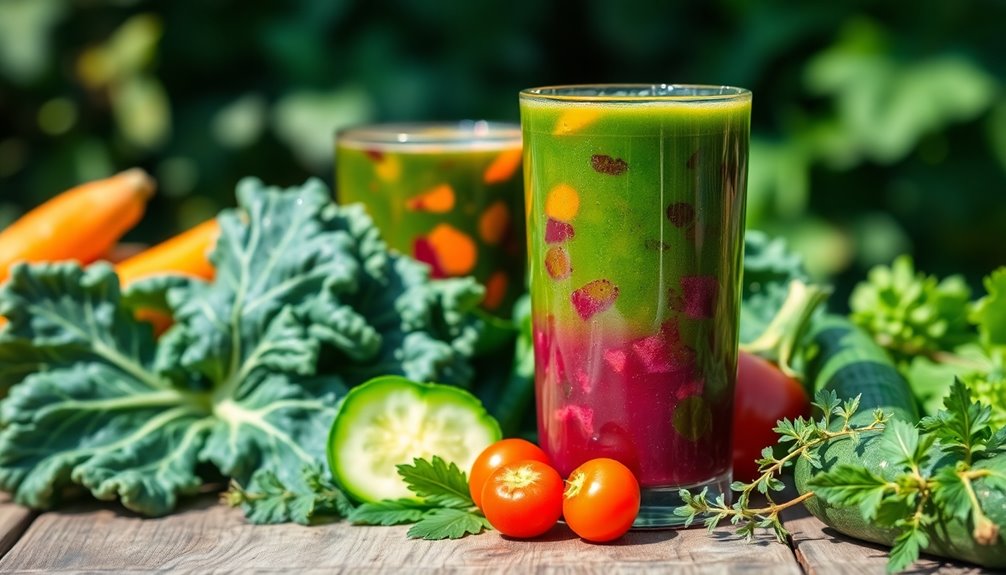Vegetable juice is packed with essential vitamins and minerals, giving your health a serious boost. It's rich in antioxidants, supporting your immune system and helping you fight inflammation. You'll experience enhanced energy and better skin health, too! Plus, homemade versions let you control ingredients for optimal results. The nutrients have high bioavailability, ensuring your body absorbs them efficiently. Want to uncover even more benefits of veggie juice? Keep exploring to unlock the full potential of this nutritious powerhouse!
Key Takeaways
- Vegetable juices are packed with essential vitamins and minerals, significantly enhancing overall nutrition and supporting immune health.
- Antioxidants in vegetable juices help reduce oxidative stress, lowering the risk of chronic diseases and promoting skin health.
- Leafy greens and cruciferous vegetables boost immune function with vital nutrients like vitamins A, C, zinc, and selenium.
- High water content in vegetable juices aids in hydration, promoting healthy skin and overall wellness.
- Regular consumption of vegetable juices contributes to energy enhancement and performance improvement through gradual nutrient release.
Rich Source of Essential Vitamins and Minerals
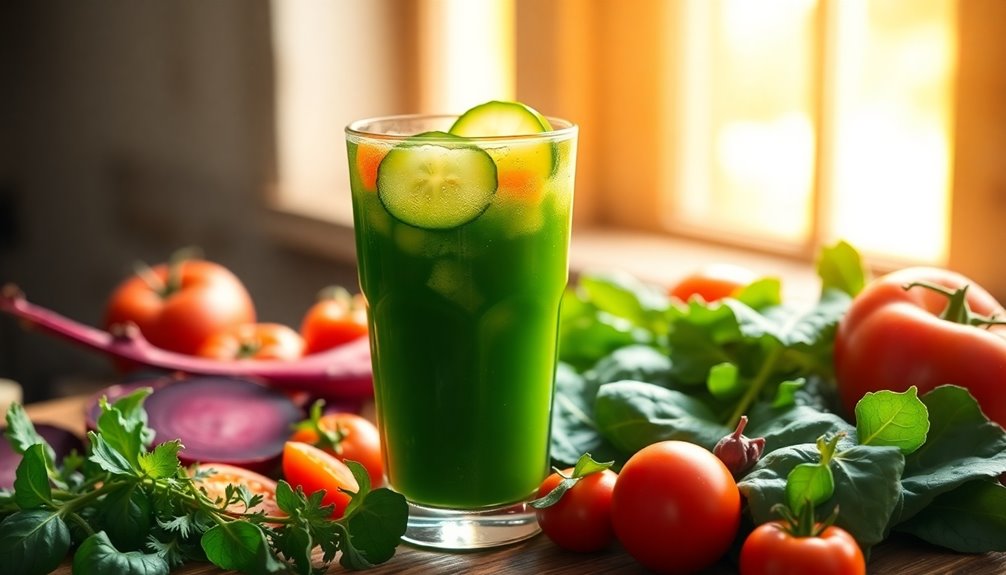
When you choose vegetable juice, you're not just enjoying a refreshing drink; you're also getting a rich source of essential vitamins and minerals. Juices like carrot and sweet potato are loaded with vitamin A, crucial for vision and immune health. You'll find vitamin C in many vegetable juices, which supports your immune system and collagen production. Plus, leafy greens like kale provide vitamin K, important for blood clotting and bone health. Additionally, incorporating low carb foods into your diet can enhance your overall nutritional intake. Don't forget minerals: potassium helps maintain healthy blood pressure, while magnesium is vital for muscle function. Homemade juice gives you concentrated nutrients in an easily digestible form, making it a smart choice for energy and overall wellness. Embrace the variety of nutrients by mixing different vegetables in your juice!
Powerful Antioxidant Protection

Vegetable juice not only provides a wealth of vitamins and minerals but also offers powerful antioxidant protection. Packed with antioxidants like vitamins C and E, along with carotenoids such as beta-carotene and lycopene, these juices help neutralize harmful free radicals. By reducing oxidative stress, they protect your cells from damage and lower the risk of chronic diseases like heart disease and certain cancers. Regularly consuming antioxidant-rich vegetable juices can enhance your body's defenses, supporting overall health and cellular protection. Plus, they may even contribute to healthier skin and improve your energy levels. Additionally, the high water content in these juices helps maintain hydration, further supporting your overall well-being. So, sip on that vibrant juice and enjoy the benefits of powerful antioxidants working for you!
Immune System Boosting Properties
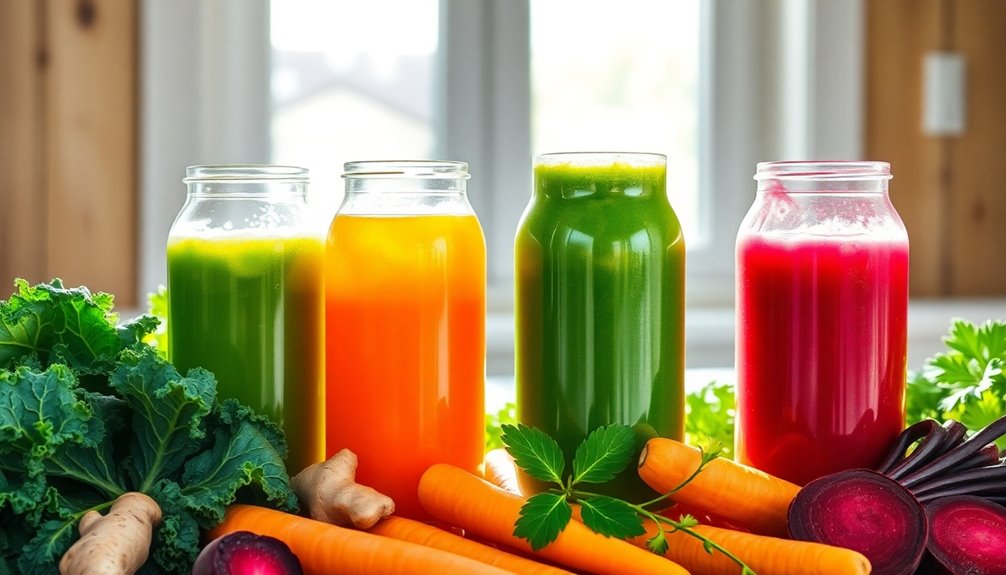
Boosting your immune system is easier than you might think, especially with the right vegetable juices in your diet. Juices packed with leafy greens like kale and spinach provide essential vitamins A and C, crucial for immune health. Adding cruciferous vegetables such as broccoli and cauliflower boosts your intake of zinc and selenium, which are vital for immune function. Don't forget beets and ginger; both are known for their anti-inflammatory properties. The antioxidants in these juices protect your immune cells from damage, while phytonutrients support their optimal functioning. Fresh juices retain all nutrients found in whole produce and regularly sipping on these nutrient-rich drinks helps reduce inflammation, detoxifies your body, and strengthens your defenses. Additionally, beet juice is rich in antioxidants that support overall cellular health, further enhancing your immune system.
Enhanced Energy and Performance
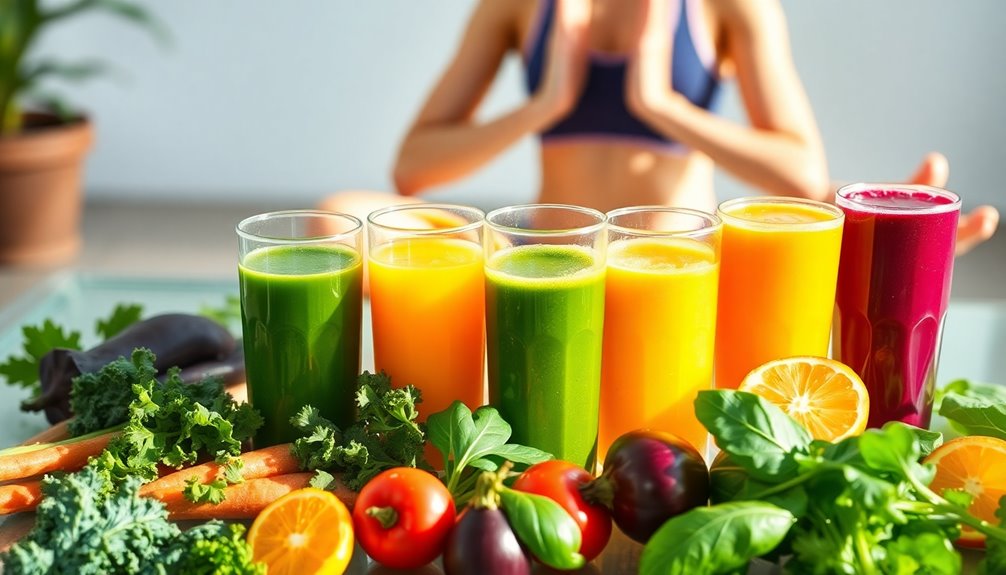
Incorporating vegetable juices into your routine not only supports your immune system but also enhances your energy and performance.
These juices deliver a natural energy boost through their rich vitamins and minerals, like vitamin C and iron. Unlike sugary stimulants, they provide a gradual release of energy, helping you avoid crashes later. Additionally, consuming educational toys that promote active play can further contribute to increased energy levels in children.
Plus, the nutrients improve your metabolism, aiding energy production and workout performance. Regular consumption of these juices can also support immune system function, promoting overall health and vitality.
If you're active, juices high in potassium and magnesium can boost endurance by preventing cramps and delaying fatigue.
They also offer a convenient way to consume essential nutrients, making them perfect for busy lifestyles.
With vegetable juices, you'll fuel your body effectively, ensuring you stay energized and ready for whatever challenges come your way.
Skin Health and Beauty Benefits
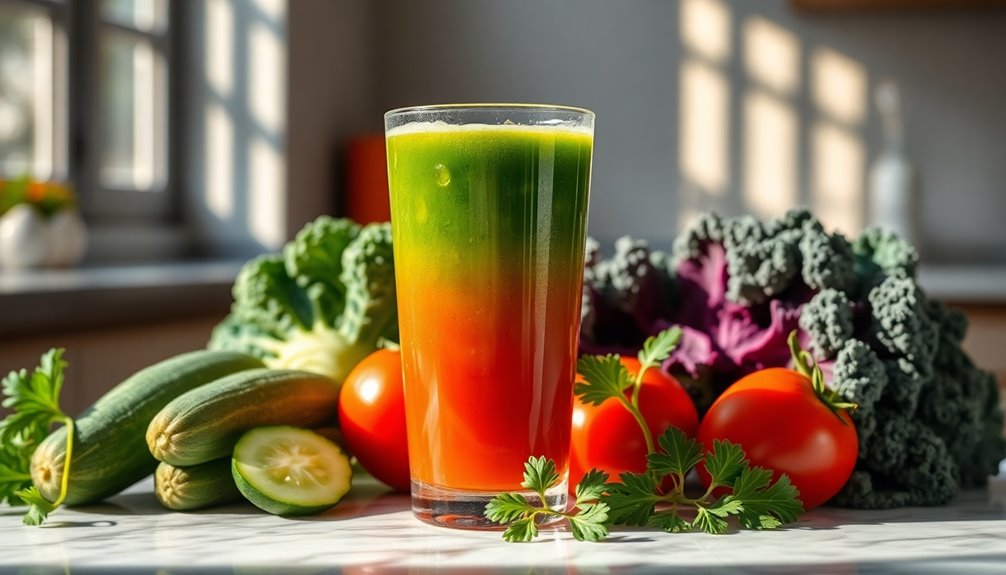
When you make vegetable juice a part of your daily routine, you'll discover a wealth of skin health and beauty benefits. The high water content helps keep your skin hydrated and supple. Packed with vitamin C, vegetable juice supports collagen production, ensuring your skin remains firm and youthful. Antioxidants like vitamins A and E protect against environmental stressors and free radicals, reducing inflammation and fine lines. Additionally, proper hydration plays a key role in maintaining overall skin elasticity and appearance. To further enhance your skin's resilience, it's important to incorporate broad-spectrum sunscreen into your daily regimen.
The minerals zinc and selenium fortify your skin's defenses against infections. By detoxifying your body, vegetable juice also helps combat issues like acne and redness. Incorporating a variety of vegetables into your juice enhances nutrient diversity, promoting a holistic approach to skincare that complements your external routines. Consistency is key for lasting results.
Supports Digestive Health
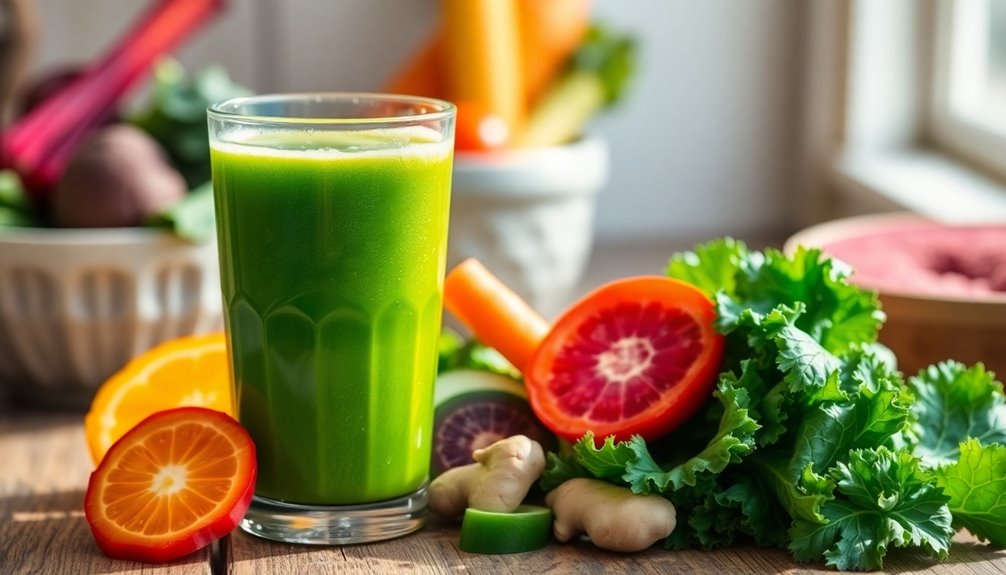
As you enjoy vegetable juice, you'll find that it plays a significant role in supporting digestive health. Packed with essential nutrients like magnesium, it aids in muscle function and regulates bowel movements.
If your juice contains pulp, you'll benefit from a modest fiber intake, promoting healthy digestion. The nutrients in green juice also nourish beneficial gut bacteria, enhancing your digestive function. Additionally, the juicing process helps to increase nutrient bioavailability, allowing your body to absorb essential vitamins and minerals more efficiently.
Plus, its easy digestibility makes it a great choice if you're dealing with gastrointestinal issues or recovering from surgery. With prebiotic compounds that support gut flora and anti-inflammatory properties that ease discomfort, vegetable juice offers a delicious way to boost your digestive health and comfort.
Enjoying it regularly can truly make a difference!
Aiding Weight Management and Detox
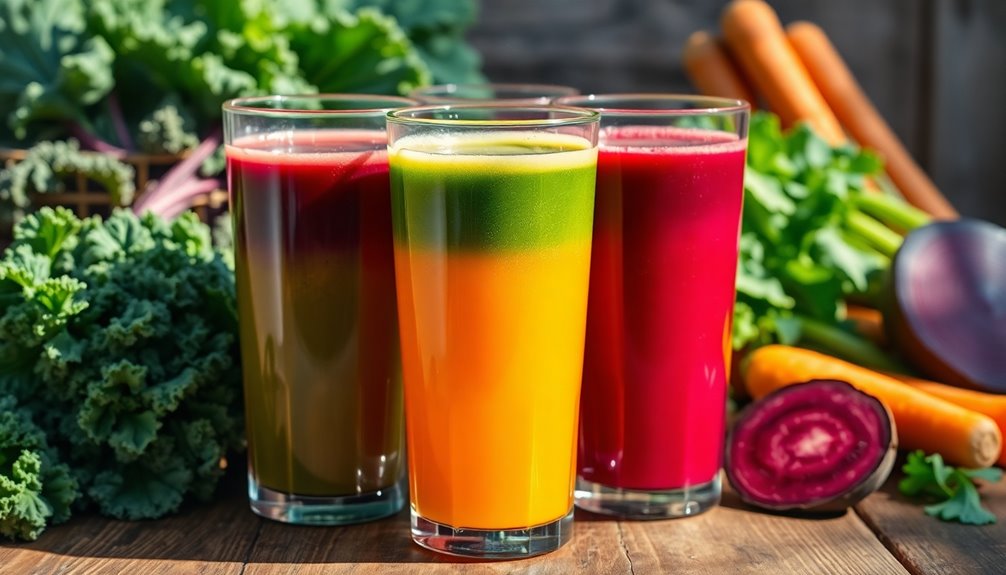
Vegetable juice serves as a powerful ally in your journey toward weight management and detoxification. With its low calorie content, it's an excellent substitute for sugary beverages, helping you cut calories without feeling deprived. The high fiber content found in juices like carrot and bottle gourd keeps you full longer, curbing cravings. Certain minerals in vegetable juices can even boost your metabolism, further supporting your weight loss efforts. Additionally, carrot juice is nutrient-rich and refreshing, making it a perfect addition to your daily routine. Plus, incorporating these nutrient-dense drinks into your diet aids detoxification by enhancing liver and kidney function. You'll also benefit from antioxidants that protect your cells and help eliminate toxins. Furthermore, vegetable juices provide a concentrated source of vitamins and antioxidants, which can support overall wellness and enhance your detox efforts.
High Bioavailability of Nutrients
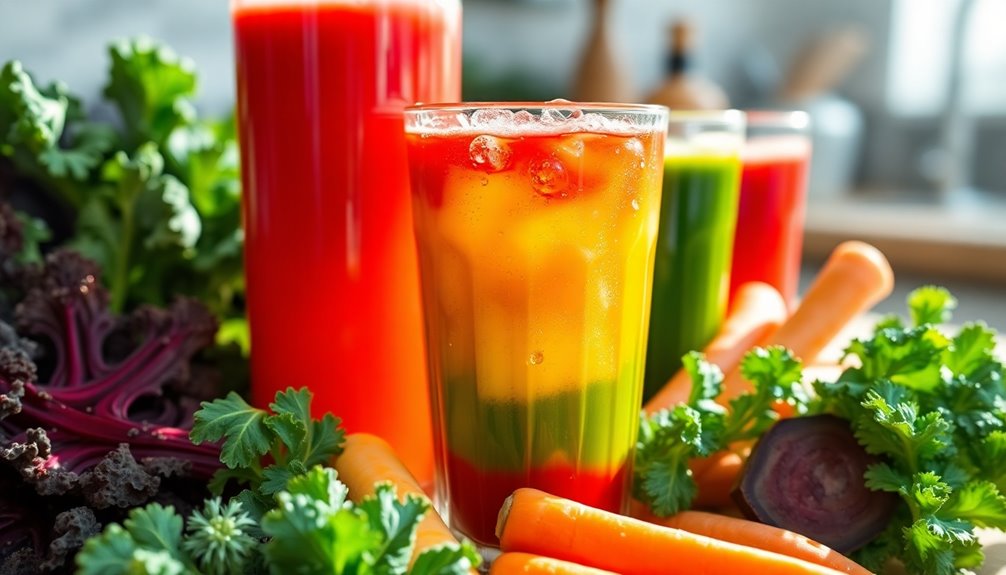
While you mightn’t realize it, the high bioavailability of nutrients in vegetable juice makes it an exceptional choice for enhancing your overall health. This is primarily because the juicing process breaks down cell walls, allowing your body to better absorb essential vitamins and minerals. In addition to providing a concentrated source of nutrients, vegetable juice is often rich in antioxidants, which help combat oxidative stress. Overall, the health benefits of vegetable juice extend beyond simple hydration, promoting better digestion and supporting your immune system.
Juices like carrot and tomato are rich in vitamin A, essential for vision and immune function. Vitamin C, abundant in vegetable juices, supports your immune system and helps with collagen production. You'll also benefit from vitamin E, which acts as an antioxidant, protecting your cells from damage. Additionally, aromatherapy can promote relaxation, further supporting overall wellness as you incorporate healthy choices like vegetable juice into your routine.
Moreover, vegetable juices provide vital minerals like iron, magnesium, and zinc, crucial for various bodily functions. Phytochemicals such as lycopene and beta-carotene are more bioavailable in juice form, offering even greater health benefits than whole vegetables. Additionally, 100% vegetable juices are associated with improved nutrient adequacy, making them a valuable addition to your diet.
Choosing vegetable juice can significantly boost your nutrient intake efficiently.
Natural Electrolyte Balance
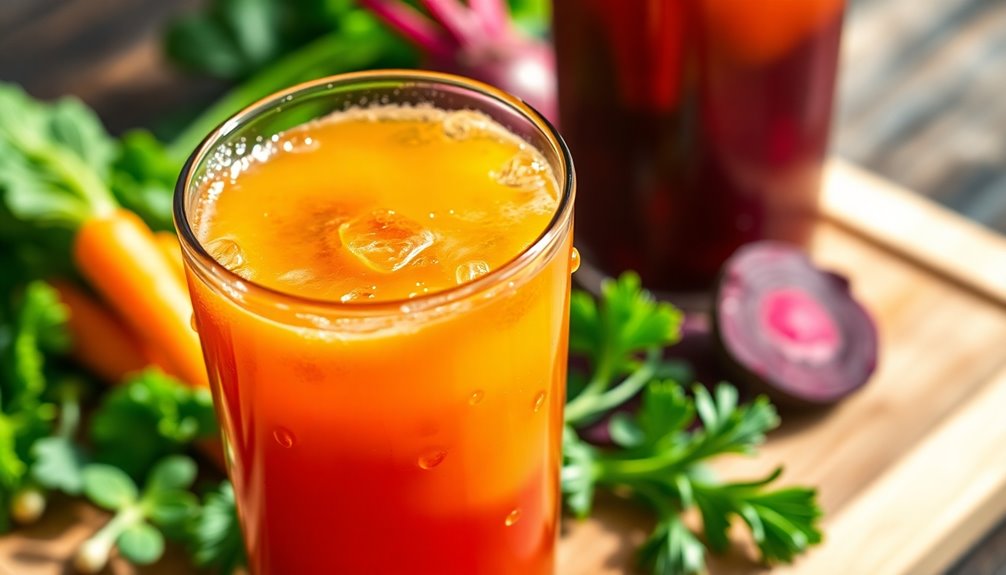
In addition to their rich nutrient content, vegetable juices play a significant role in maintaining your body's natural electrolyte balance. Ingredients like beets, carrots, and celery are packed with potassium and natural sodium, essential for regulating fluid balance and supporting hydration. These electrolytes are crucial for nerve impulse conduction, muscle contraction, and blood pressure maintenance. By incorporating electrolyte-rich vegetable juices into your diet, especially during physical activity, you can help keep your electrolyte levels optimal. Coconut water can also enhance the electrolyte content of your juices, providing an additional boost to your hydration efforts. Additionally, consuming vegetable juices regularly can contribute to an overall increase in your daily vitamin intake, which is vital for maintaining good health.
Homemade juices allow you to control ingredients while maximizing nutrients. Regularly drinking these juices not only aids hydration but also supports muscle function and stable energy levels, making them a smart choice for your overall health.
Reduced Inflammation for Overall Wellness
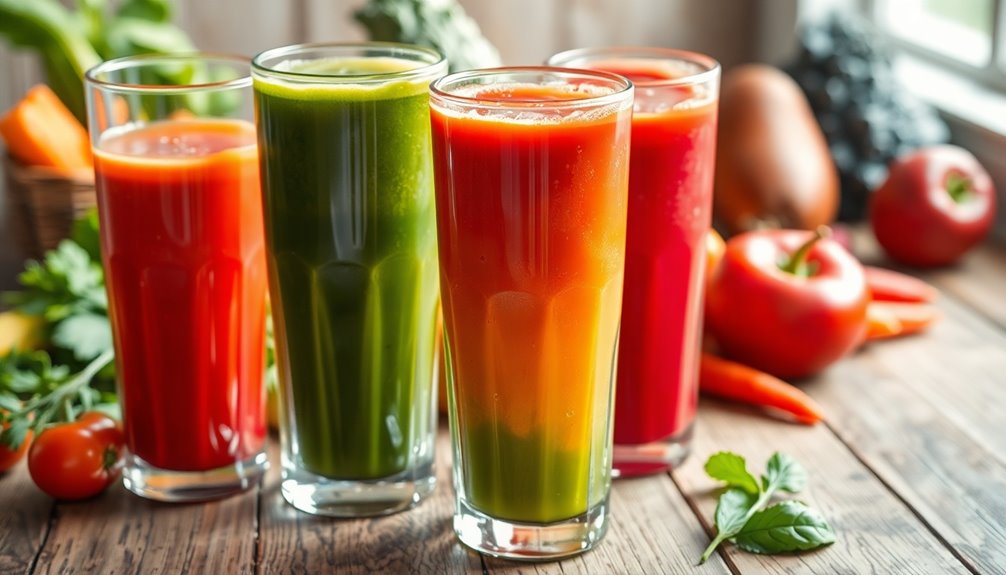
With the right blend of ingredients, you can harness the anti-inflammatory benefits of vegetable juice to enhance your overall wellness.
Leafy greens like kale and spinach are packed with quercetin, which inhibits inflammation. Additionally, consuming green tea may provide complementary benefits, as it has been linked to improved cognitive function and reduced inflammation. Beets, rich in betalains and nitrates, support blood flow while reducing inflammation. Adding ginger to your juice introduces gingerols and shogaols that soothe your digestive system. This powerful combination not only helps manage chronic diseases like arthritis and cardiovascular issues but also supports your immune system. By including celery's phytochemicals in your juice, you can further boost its anti-inflammatory properties.
By choosing vegetable juice over fruit juice, you benefit from lower sugar content and higher antioxidant levels, making it an ideal choice for reducing inflammation and promoting overall health. Additionally, vegetable juice is often rich in vitamins and minerals that support your immune system and enhance energy levels. Embracing the lowsugar vegetable juice benefits can help you maintain steady blood sugar levels while still enjoying a delicious, flavorful drink. With a variety of options available, from kale to beet juice, you can easily incorporate nutrient-dense beverages into your daily routine.
Start juicing for a healthier you!
Frequently Asked Questions
Can Vegetable Juice Replace Whole Vegetables in My Diet?
Vegetable juice can't fully replace whole vegetables in your diet. While it offers essential vitamins and minerals, it lacks fiber, which is crucial for digestion and satiety.
Relying solely on juice may lead to nutrient imbalances and excessive calorie intake. It's best to enjoy vegetable juice as a supplement to a balanced diet that includes whole veggies for optimal health benefits.
Incorporate a variety of both to maximize your nutrient intake!
How Often Should I Drink Vegetable Juice for Optimal Health?
To optimize your health, aim to drink vegetable juice daily, but balance it with whole vegetables in your diet.
Variety's crucial, so mix different juices to get a range of nutrients. You might start with a glass in the morning or as a midday boost.
Listen to your body; if you feel energized, you're on the right track.
Just remember, moderation is key to avoid excessive sugar intake from juices.
Are There Any Side Effects of Consuming Vegetable Juice?
You might think vegetable juice is a health miracle, but it's not without its side effects.
You could experience digestive issues due to low fiber, or even face blood sugar spikes if you're consuming fruit-added juices.
If you have kidney problems, high oxalate content in green juices might pose risks.
Always remember, while juices can boost your nutrient intake, they shouldn't replace whole foods in your diet.
Balance is key!
Is Homemade Vegetable Juice Better Than Store-Bought?
Homemade vegetable juice is often better than store-bought. You get to control the ingredients, ensuring no added sugars or preservatives.
It preserves more nutrients and enzymes, especially if you use cold-pressed methods. Plus, you can customize flavors to suit your taste.
While it may take time to prepare and has a shorter shelf life, the freshness and health benefits you gain make it worth the effort.
Can I Use Vegetable Juice in Cooking or Baking?
Imagine the vibrant colors of fresh vegetable juice swirling into your mixing bowl, infusing your batter with life. Yes, you can definitely use vegetable juice in cooking or baking!
It adds moisture and flavor to cakes and muffins, while also enhancing soups and sauces. By swapping out some liquids with juice, you'll create unique flavor profiles and boost nutrition.
Conclusion
Incorporating vegetable juice into your diet isn't just a trendy choice; it's a smart way to supercharge your health. Many believe that juicing strips away vital fiber, but the truth is, it delivers a concentrated dose of nutrients that your body craves. By sipping on veggie juice, you're not only boosting your vitamin intake but also supporting your immune system and enhancing your energy levels. So, raise your glass to a vibrant, healthier you! Cheers to your veggie victory!
Cindy thoroughly researches juicing trends, techniques, and recipes to provide readers with practical advice and inspiration. Her writing style is accessible, engaging, and designed to make complex concepts easy to understand. Cindy’s dedication to promoting the advantages of juicing shines through her work, empowering readers to make positive changes in their lives through the simple act of juicing.

